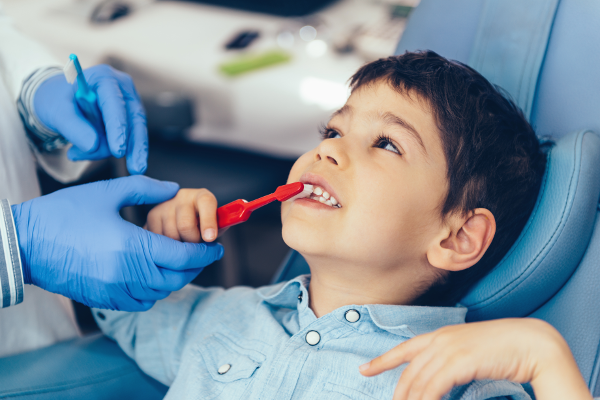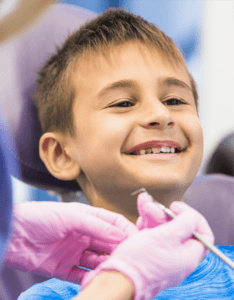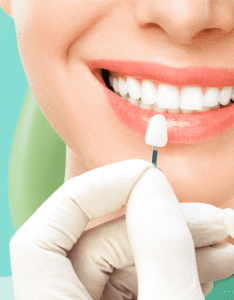Regular visits to the dentist are very important and they should begin at a very young age. Pediatric dentists receive extra training to treat children from infancy through the teenage years.
Healthy teeth and mouths are very important for the overall health and development of children. Overlooking or neglecting dental issues can lead to serious issues like tooth loss, chronic pain, poor academic performance, and other complications.
Infant Dental Care
Good oral hygiene begins at birth. Parents should gently wipe or massage the baby’s gums with a clean wet washcloth or gauze after each feeding or at least every evening before bedtime.
Dental decay is one of many transmittable infections and diseases. Parents should avoid testing the temperature of a bottle with their mouths, sharing utensils, or other things that may expose the infant to the infections.
If you live in an area without fluoride-treated water or you primarily use well water, consult your infant’s healthcare provider. They may recommend a fluoride supplement.
6 to 12 Months
Infants typically begin teething between four and six months of age. Most babies get their first tooth at around six to eight months. Continue to clean your baby’s gums after each feeding. Once their first tooth comes in, introduce a soft-bristled toothbrush in addition to massaging their gums.
As your child learns to drink from a cup, one of the easiest ways to promote healthy oral hygiene and diet is limiting the consumption of juice, sweet beverages, and foods. Avoid allowing your child to walk around with a bottle or “sippy-cup”.
Regularly inspect your child’s overall oral health. Lift their upper and lower lips to look for marks or injuries to the gums or soft tissue. Check the teeth for small white or brown spots, which may indicate dental decay (cavities). As your child becomes mobile, stay alert and aware of any dental or facial injuries.
Schedule your child’s first dental check-up before their first birthday. This will allow your pediatric dentist to assess their overall health and give expert advice for at-home care and hygiene practices.
12-24 Months
Continue to brush your child’s teeth at least twice a day with a soft-bristle brush and water. Help them learn and develop healthy dental hygiene habits. Because their hand coordination is still developing, children will need help brushing for several years.
Inspect their gums, soft tissue, and teeth regularly. If anything changes or you see white or brown spots on their teeth, schedule another appointment with your dentist as soon as possible.
Follow the recommended schedule of dental exams and treatments your dentist lays out. Most pediatric dentists recommend exams and cleaning every 6 months.
Caring for Baby Teeth
Proper care for a child’s baby teeth (called primary teeth) is very important. Baby teeth hold space for their future adult teeth. If a baby tooth is unhealthy, decays, or must be removed too early, the space for the adult teeth may be lost. This will cause other problems down the road and may result in expensive orthodontic treatments.
Baby teeth are also important for proper speech development. Children typically begin speaking around the time their first teeth come in. There are a number of dental conditions that can impact speech development, including premature tooth loss, improper jaw structure, and other conditions. A pediatric dentist will make sure a child’s mouth is developing properly.
Thumb or finger sucking, using a pacifier, and other similar habits potentially impact the structural health and development of a child’s mouth. Consult your dentist if your child still has these habits past age 3.
Most children begin losing their baby teeth around age 5 or 6. They often lose the front teeth first and it may take until age 12 or 13 until all the permanent teeth finally come in.
If a baby tooth gets knocked out or injured (rather than falling out naturally), contact your dentist to make sure the gums are still healthy and that there are no pieces of the tooth left in the mouth. If left untreated, trauma to a baby tooth can lead to trauma to the adult tooth that will come later.
Cavity Prevention and Care
Applying dental sealants to your child’s permanent adult teeth as they come in will help keep their teeth healthy. Sealants are a protective coating that dentists apply to the back teeth (molars) that do most of the chewing. The sealants prevent bacteria and acid from penetrating the tooth and causing cavities. Sealants can reduce the risk of tooth decay in molars by up to 80%!
Sealants last for years and are painless to apply. Many dental insurance plans will cover at least part of the cost of pediatric sealants.
Investing in your child’s oral health is an important step to helping them grow into strong, healthy adults. Laying a strong, healthy foundation of oral health will lead to many years of a healthy smile and a healthier life.





